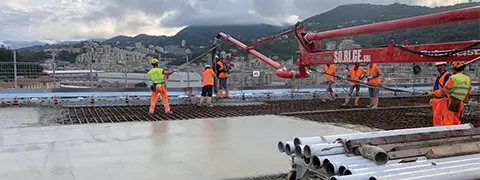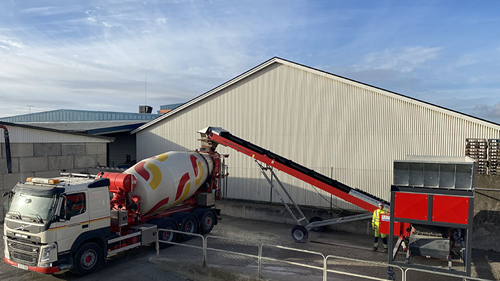

Interviews
/
10/9/2025
Concrete in transition: Advanced admixtures from Mapei’s RE-CON Line drive sustainability in Portugal
From the reduced use of fly ash to the rise of recycled aggregates, Mapei Portugal meets market challenges with high-performance admixtures (including RE-CON solutions) designed for sustainability and durability.
The Portuguese ready-mix concrete market is evolving toward more sustainable and technically demanding solutions. In this interview, Arnaldo Sousa and Pedro Sousa, line specialists for concrete admixtures at Mapei Portugal, share insights on how advanced admixtures, including those from the RE-CON line, enable the use of recycled materials and lower-grade raw materials without compromising performance.
What are the main developments that you witnessed in the Portoguese concrete industry in the latest years? What are its main characteristics?
Over the past few years, the Portuguese ready-mix concrete industry has undergone significant changes, particularly in the use of aggregates and binders. One notable development has been the discontinuation of fly ash, leading to the adoption of limestone filler as a complementary material to CEM II/A-L and CEM I types of cement. This shift has created new challenges for admixture manufacturers, who are now required to develop formulations that ensure both effective workability and long-term slump retention.
In parallel, the use of crushed aggregates has become increasingly common across the Portuguese market. This trend has made concrete production more demanding in terms of water requirements, which directly impacts the ability to achieve the desired final strengths.
As for the most commonly produced concrete strength classes, C25/30 and C30/37 are predominant, while slump classes S3 and S4 are the most frequently specified. According to the Portuguese Ready-Mix Concrete Association (APEB), the total market volume reached 7.5 million cubic meters in 2024.

Today the concrete industry is facing big challenges such as the need to produce low carbon, more sustainable mixes while keeping high performance levels.
Is sustainability a crucial issue for the Portuguese concrete manufacturers?
Sustainability has become an increasingly central aspect of daily operations in the Portuguese ready-mix concrete sector. Key developments include the introduction of recycled water, the use of supplementary materials to reduce cement content, and the incorporation of aggregates that would previously have been rejected due to quality concerns. These practices reflect a growing commitment to environmental responsibility, but they also present technical challenges. Modern admixtures must now meet higher performance standards, ensuring optimal rheological performance, consistent workability retention, and reliable mechanical strength.
What are the main factors that encourage sustainability? Which obstacles are there, on the other hand, towards manufacturing more sustainable concrete?
Concrete producers are increasingly focused on reducing high cement content, which not only represents a major cost factor but also contributes significantly to CO2 emissions during production. One promising avenue currently under investigation is the use of calcined clay, which cement manufacturers see as a viable solution to lower the clinker dosage and offer a more sustainable product to end users.
As admixture producers, we must be prepared to adapt our formulations to perform effectively with this emerging binder system. However, the shift toward alternative binders and lower-grade raw materials presents a considerable challenge: maintaining optimal workability and rheological properties without increasing water content. Achieving this balance is essential to ensure both the performance and long-term durability of the final product - concrete.

What can you expect from the RE-CON line in the next few years in this market? How can these technologies help to win new customers and strengthen relationships with existing ones?
We are at the early stages of integrating recycled materials into the Portuguese concrete market. The use of recycled water—at the highest possible dosage—is also gaining increasing attention. In this context, the RE-CON line represents a strategic opportunity to demonstrate to both current and prospective customers that Mapei is at the forefront of technological innovation.
These solutions go beyond reducing waste or reusing hardened concrete. They also empower concrete producers to work with less refined raw materials, without compromising performance. This not only supports sustainability goals but also reinforces trust and collaboration with customers who are seeking advanced, responsible solutions.
What can you expect from this line in the Portuguese market in the next few years?
Given all the challenges outlined above, we anticipate that the RE-CON line will play an increasingly important role in the Portuguese market. As sustainability and performance demands continue to rise, low-tech admixtures are likely to be phased out, making way for advanced, high-performance solutions.
It will be a long and demanding journey, but we are fully committed and focused on supporting our customers with cutting-edge technologies that meet the evolving needs of the industry.










